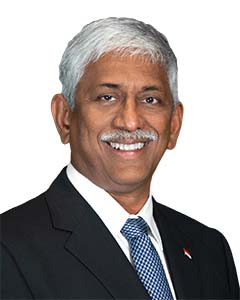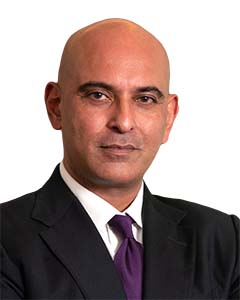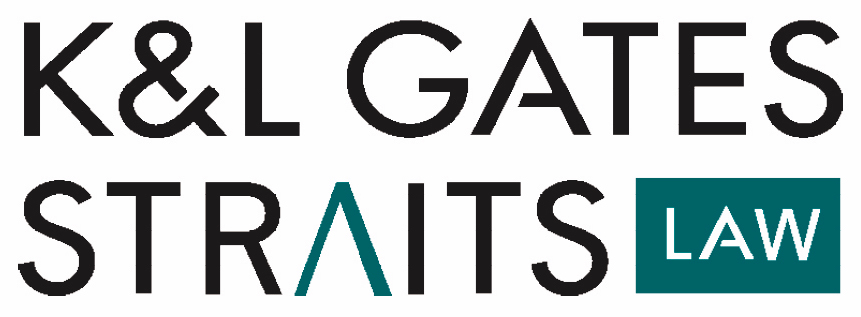Supreme Court judgment opens new frontier for Singapore-seated arbitration for Indian parties, write Sreenivasan Narayanan, Raja Bose and Rob Houston
The Supreme Court’s landmark decision in PASL Wind Solutions Private Limited v GE Power Conversion India Private Limited (PASL) in April 2021 has been much debated. We intend to discuss aspects of its practical effect in the context of Singapore as an arbitration centre and how Indian parties can utilise the decision. Indian parties, including subsidiaries of foreign investors, can and should look at the avenues opened by the decision, and consider Singapore as the seat of arbitration.

Managing Partner, Singapore office
K&L Gates Straits Law in Singapore;
Senior Counsel, FCIArb, FSIArb
Tel: +65 6713 0234
Email: sreeni.narayanan@klgates.com
While Singapore’s role as an international arbitration centre is well known, its deep legal ties with India are often not truly appreciated. Singapore traces its origins as a global trading centre to Sir Stamford Raffles’ arrival in 1819. In 1824, possession was handed to the British by the Dutch, ignoring the rights of native rulers as colonial powers of the day were wont to do. In 1825, the East India Company was given control of Singapore, later handed to the colonial government of British India. Singapore was governed from Kolkata until 1867, when it became a direct colony. However, the influence of the Indian legal system continued, with the Indian Penal Code and the Indian Evidence Act being imported wholesale.
This influence continues, with Supreme Court of India rulings given significant weight in cases where the statutes are in pari materia (of the same matter). Apart from having a judiciary and lawyers who are familiar with Indian law concepts, close economic and even familial ties make Singapore unique as an international legal centre for even domestic disputes from India, as Singaporeans understand the social and economic fabric of India. The India-Singapore relationship was enhanced by the bilateral Comprehensive Economic Co-operation Agreement of 2005.
PASL allows Indian parties to choose a foreign arbitral seat to resolve disputes while retaining access to Indian courts for enforcement of the “foreign” arbitral award. PASL has been hailed as a victory for party autonomy; the question now is: What should Indian parties do with this newly affirmed freedom?
PASL’s implications
In PASL, the Supreme Court considered the related questions of “whether two companies incorporated in India can choose a forum for arbitration outside India” and whether such an award would be enforceable as a “foreign award” under Part II of the Arbitration and Conciliation Act, 1996, in addition to the 1958 Convention on the Recognition and Enforcement of Foreign Arbitral Awards (the New York Convention). In addressing these questions, the court confirmed that “what is necessary for an award to be designated as a foreign award under section 44 [of the act] are four ingredients:
(i) the dispute must be considered to be a commercial dispute under the law in force in India;
(ii) it must be made in pursuance of an agreement in writing for arbitration,
(iii) it must be disputes that arise between “persons” (without regard to their nationality, residence, or domicile), and;
(iv) the arbitration must be conducted in a country which is a signatory to the New York Convention.”
The court went on to confirm that when Indian parties choose foreign seats for the arbitration of their disputes, awards resulting from such arbitrations may be enforceable in India. As the judgment succinctly stated, “the decks have now been cleared to give effect to party autonomy in arbitration”.

Partner
FCIArb, FSIArb
K&L Gates Straits Law in Singapore;
Tel: +65 6507 8125
Email: raja.bose@klgates.com
New paradigm
PASL presents a paradigm shift for Indian parties and subsidiaries of foreign investors considering their dispute settlement options with Indian counterparties. As the PASL judgment noted, the selection of a foreign arbitral seat by Indian parties provides “two bites at the cherry, namely, the recourse to a court or tribunal in a country outside India for setting aside the arbitral award passed in that country on grounds available in that country … and then resisting enforcement under the grounds mentioned in section 48 of the Arbitration Act.”
This point is significant as the designation of a particular seat for an arbitration imports the supervisory jurisdiction of the courts of the designated jurisdiction and its curial law (i.e., the “lex arbitri” or procedural law of the arbitration). Indian parties may prefer to select a foreign arbitral seat to avoid the greater likelihood of judicial intervention, a feature of domestic arbitration in India. This can be achieved without losing the advantage of recourse to Indian courts available in international arbitrations, such as the enforcement of a foreign arbitral award or application for interim measures, both important in proceedings where parties maintain most assets in India. Additionally, obtaining an international award opens up avenues for enforcement outside of India, particularly in signatories to the New York Convention (i.e., the entire developed world).
PASL will be a source of comfort for foreign investors or parent entities wishing to avail themselves of arbitral seats with which they are more familiar in contractual disputes involving their Indian subsidiaries or investment vehicles. Indian companies’ growing presence in the global marketplace will also require measures to reduce transactional costs and uncertainty through greater standardisation of contracting policies. Back-to-back transactions, where one leg is in India and one is transnational, can now have identical and aligned dispute resolution provisions. But one caveat must be considered. As the Supreme Court warns in PASL, “if, on the facts of a given case, it is found that two Indian nationals have circumvented a law which pertains to the fundamental policy of India, such foreign award may then not be enforced under section 48(2)(b) of the Arbitration Act.”

Senior Associate
K&L Gates Straits Law in Singapore
Tel: +65 6507 8121
Email: robert.houston@klgates.com
Seat selection
The main considerations for the choice of an arbitral seat are: Diversity and sophistication of arbitral institutions and arbitrators; fairness and efficiency of process; avoidance of regional or local court “home field advantage”; enforcement of the arbitral award under the New York Convention; available and suitable standard dispute resolution clauses; time zones and physical distance; and relative expense.
Singapore ticks all the boxes, as is evident from its success as a dispute resolution centre.
Singapore is a contracting state of the New York Convention and hosts varied options for the professional administration of Singapore-seated arbitrations. The Singapore International Arbitration Centre (SIAC) has recently expanded its physical presence to support case management globally. The SIAC established its first overseas representative office in Mumbai in 2013, and now has the SIAC Americas, SIAC Seoul and SIAC Shanghai offices. Singapore also hosts a range of other institutions, including the Permanent Court of Arbitration, the International Chamber of Commerce’s International Court of Arbitration, and the Singapore Chamber of Maritime Arbitration. Singapore also boasts the specialised dispute resolution facilities of Maxwell Chambers.
The pro-arbitration culture of Singapore courts is in sync with recent Indian trends of promoting party autonomy, and the law of international arbitration is constantly reviewed and fine-tuned. Within a five-hour direct flight of most Indian business hubs and in a more convenient time zone, the city also has strong government backing in maintaining its position as the top international arbitration centre.
Singapore’s value propositions extend beyond traditional international arbitration. The Singapore International Mediation Centre and the SIAC offer a hybrid approach to dispute resolution in the form of Arb-Med-Arb (arbitration-mediation-arbitration). In Arb-Med-Arb, parties start an arbitration in the first phase, then enter a second phase to reach a mediated settlement (which may then be recorded as a consent award). If there is no settlement, the arbitration will continue as a final phase.
The Singapore legal community is also sophisticated and cosmopolitan, maximising choice in the appointment of arbitrator or counsel. This is particularly important where one or both of the Indian parties are subsidiaries of foreign entities or where the dispute involves transnational issues. Using our firm as an example, we have lawyers – qualified in Singapore, India, England and Wales, the United States, New Zealand and France – who speak English, Hindi, Bengali, Bahasa Indonesia, French and Korean, all under one roof.
Our experience working with Indian parties and counsel has also been edifying. The shared legal heritage enables us, as Singapore lawyers, to work seamlessly with Indian counsel, with both sides undertaking appropriate roles and responsibilities. Common legal language and understanding of concepts are critical when urgent matters must be addressed, such as where interim measures or proceedings to set aside arbitral awards are required.
In recent years, thousands of Indian corporates have set up in Singapore, including those setting up vehicles for international acquisitions and trading. Indian parties understand that Singapore is not only attractive for business, but for dispute resolution as well, which is why SIAC’s 2020 Annual Report was able to report that “India, US and China topped the foreign user rankings” for that year. Facts speak for themselves. When an overseas arbitration centre beckons, look east.
Sreenivasan Narayanan, senior counsel and FCIArb, FSIArb, is the managing partner of K&L Gates Straits Law in Singapore. You can contact him at +65 6713 0234 and sreeni.narayanan@klgates.com
Raja Bose, FCIArb, FSIArb, is a partner at K&L Gates Straits Law in Singapore. You can contact him at +65 6507 8125 and raja.bose@klgates.com
Rob Houston is a senior associate at K&L Gates Straits Law in Singapore. You can contact him at +65 6507 8121 and robert.houston@klgates.com
K&L Gates Straits Law
9 Raffles Place, #32-00 Republic Plaza
Singapore, 048619
Contact details
Tel: +65 6713 0200



























